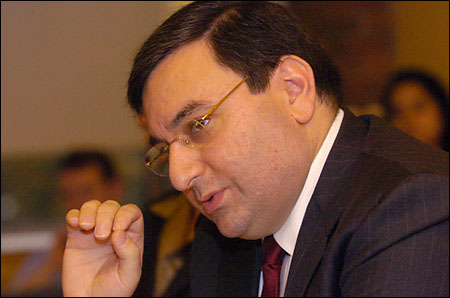Iraq’s ambassador to UN hopeful about democracy
Istrabadi: Federalism best system for moving forward

Feisal Amin al-Istrabadi, Iraq’s ambassador and deputy permanent representative to the United Nations, provided an inside look at the writing of the Iraqi constitution and the future of the democratic process Monday (Oct. 31) at the Kennedy School of Government.
Istrabadi was a drafter of the Iraqi interim constitution, the Transitional Administrative Law (TAL), and the principle author of its Bill of Fundamental Rights. On Oct. 15, the Iraqi people passed a referendum on the permanent constitution, and elections for the National Assembly will be held in December.
Istrabadi said a key element of the constitution was altered at the last moment in order to gain participation from Sunni Arabs in the referendum. Sunni groups stayed away from the polls in the assembly elections of last January, leaving them with a small minority of seats in a parliamentary body made up of mostly Shiite parties and a Kurdish alliance, which in turn did much of the writing of the constitution.
The original draft stated that the constitution couldn’t be amended until after two cycles of parliamentary elections – a full eight years, said Istrabadi. That provision was rescinded and the document can be revised in the next assembly. The hope is that Sunni groups will participate in the December elections to increase their representation in order to amend the constitution.

Why would the Kurds and the Shiites agree to that change? “Very simply, they were afraid that if they didn’t make that compromise the document would be defeated,” said Istrabadi, speaking to a small group gathered around a conference table. “Politics were going on in Iraq for the first time in 35 years.”
Despite the violence in the country and the complicated spectrum of political and ethnic factions, Istrabadi argued strongly that federalism is the best system for moving Iraq forward.
“A federalist program – by no means an ideal one – is the only key to the reunification of the country,” he said. “As of March 2003, when U.S., UK, and allied forces intervened militarily in Iraq, there was not one state in Iraq, there were not two, there were three … at least.” Istrabadi then detailed the political subregions, differing court systems and currencies that existed within Iraq at that time. “In short, the country was in fact dissolved,” he said. “There was a legal fiction under international law that there was an Iraq. What the constitution is now attempting to do is reintegrate the country.”
Istrabadi spoke of the many issues – such as the parameters of federalism, human rights, and role of religion in legal life – that the next National Assembly must address through lawmaking.
Similar to the American Constitution, Iraq’s leaves much to be interpreted, and Istrabadi said critics have pointed to this fact “as though this is somehow a failing. The American Constitution is a fairly terse document, one capable of interpretation, deliberately so,” he said. “They don’t try and solve all problems. This is why in Europe, where they have laundry-list constitutions, they have to amend them every few years.”
Most importantly, Istrabadi said the new assembly has to address issues that will help bring jobs and economic development back to Iraq. Specifically, it must be decided who controls Iraq’s natural resources. “This is a critical issue for us because it has everything to do with foreign investment,” said Istrabadi.
A strong and competent legal system is also crucial, Istrabadi said. He recalled his shock when a top business leader said his biggest concern in doing business in Iraq was not the issue of security but rather having a system for legal recourse.
“Countries are not going to invest if there is not a legal system on which they can rely,” he said.
The talk was sponsored by the Governance Initiative in the Middle East, a program of the Kennedy School’s Belfer Center for Science and International Affairs, and hosted by the Initiative’s executive director, Barbara Bodine, former U.S. ambassador to Yemen. Also in attendance was Sir Kieran Prendergast, past British ambassador to Turkey and current Goodman United Nations Fellow at the Belfer Center.




